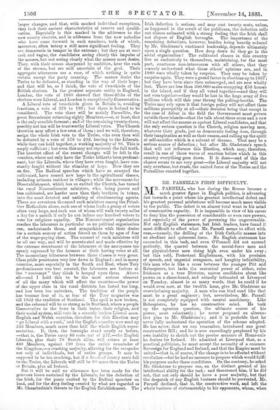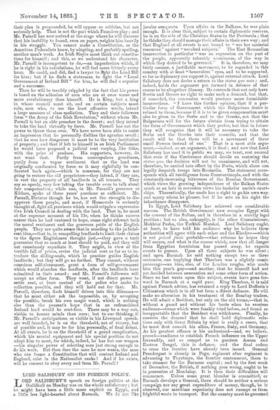MR. PARNELL'S FIRST DIFFICULTY.
R. PARNELL, who has during the Recess become a much greater figure in English politics, is advancing fast towards a point where his greatest intellectual defect and his greatest personal misfortune will become much more visible to the public. The defect is an almost total want in his mind of constructive capacity. It is impossible in view of his career to deny him the possession of considerable or even rare powers, and especially of the power of governing the ungovernable. Not only English statesmen, but Irish leaders, have found it most difficult to effect what Mr. Parnell seems to effect with ease,—namely, the drilling of the Irish Catholic masses into an obedient and quiescent force. No English statesman has succeeded in this task, and even O'Connell did not succeed perfectly, the quarrel between the moral-force men and the physical-force men rising high even under his sway ; but this cold, Protestant Englishman, with his precision of speech, and ungenial arrogance, and haughty inflexibility, this man who is like a cross between the younger Pitt and Robespierre, but lacks the oratorical power of either, rules Irishmen as a true Dictator, moves candidates about like pawns on a chess-board, and actually intimated at Liverpool on Tuesday, almost in so many words, that he could if he would even now, at the twelfth hour, give Mr. Gladstone an overwhelming majority. A man who can bind sand like that must be a great engineer ; but, nevertheless, Mr. Parnell is not completely equipped with mental machinery. Like Robespierre, he has no constructive mind. He took up the agrarian question, the ultimate source of his power, most reluctantly ; he never proposed an alterna- tive plan to Mr. Gladstone's ; and it is probable that he never fully understood the operation of the scheme adopted. He has never, that we can remember, introduced one great constructive Bill ; and he is now exceedingly perplexed by his own inability to sketch out the precise measure of Home-rule he desires for Ireland. He admitted at Liverpool that, as a practical politician, he must accept the necessity of a common Sovereign for England and Ireland, and that the Empire mast be united—that is, of course, if the change is to be effected without revolution—but he had no measure to propose which would fulfil his purposes under those conditions. On the contrary, he asked Mr. Gladstone to propose one, on the distinct ground of his intellectual ability for the task ; and threatened him, if he did not, that not only should he have a poor majority, but that the despatch of any English business should be prevented. Mr. Parnell declined, that is, the constructive work, and left the whole business of statesmanship to his opponents, whom, when their plan is propounded, he will oppose or criticise, but not seriously help. That is not the part which Founders play ; and Mr. Parnell has now arrived at the stage where he will discover that his inability to found, even on paper, weights him heavily in his struggle. You cannot make a Constitution, as the American Federalists knew, by adopting, and probably spoiling, another man's work. An Irish Sieyes must think out constitu- tions for himself ; and this, as we understand his character, Mr. Parnell is incompetent to do,—an imperfection which, if he is right in his calculations, he will feel more bitterly every hour. He could, and did, find a lawyer to ffght the Land Bill for him; but if he finds a statesman to fight the " Local 'Government of Ireland Bill" for him, he will find a superior and a successor.
Then he will be terribly crippled by the fact that his power is based on the adhesion of men who are at once worse and more revolutionary than himself. He is King, but a king in whose council must sit, and on certain subjects must rule, men who, to use the least offensive words, intend a large measure of class spoliation. They and their followers form "the Army of the Irish Revolution," without whom Mr. Parnell is but an able preacher in the desert ; and they intend to take the land virtually by force. Mr. Parnell has not the power to throw them over. We have never been able to resist an impression that he personally dislikes the agrarian revolt ; that he sees how dangerous it must be to the very institution of property ; and that if left to himself in an Irish Parliament he would have proposed a judicial rent varying, like tithe, with the price of produce. His supporters, however, do not want that. Partly from unscrupulous greediness, partly from a vague sentiment that as the land was originally confiscated by force so it may rightfully be con- fiscated back again—which is nonsense, for they are not going to restore the old proprietors—they intend, if they can, to vest the property of all landlords in all tenants. They say so openly, very few taking the trouble even to talk about fair compensation ; while one, in Mr. Parnell's presence at Kildare, spoke of three years' purchase as sufficient. Mr. Parnell, Dictator though he be, has not the strength to dis- approve these people, and must, if Home-rule is seriously thought of, fight all provisoes which would cripple a representa- tive Irish Council in dealing with the land. That is, he must at the supreme moment of his life, when he thinks success nearer than he had ventured to hope, come right athwart both the moral sentiment and the generous pride of the English people. They are quite aware that in acceding to the jtrlicial- rent idea,—that is, in compelling landlords to limit their claims to the figure Englishmen thought just,—they gave a tacit guarantee that so much at least should be paid, and they will not consciously repudiate it. They might, in view of the terrible fall of prices, revise the judicial rent so far as to in- troduce the sliding-scale, which in practice guides English landlords ; but they will go no farther. They cannot, without conscious self-abasement, grant a form of self-government which would abandon the landlords, after the landlords have submitted to their award ; and Mr. Parnell's followers will accept no other form. They want, if not direct power to settle rent, at least control of the police who make its collection possible, and they will hold out for that. Mr. Parnell, therefore, finds himself driven into this dilemma— that he must either ask the impossible, or, by accepting the possible, break his own magic wand, which is nothing else than the peasant's hope that in an enfranchised Ireland land would be rent-free. There may be a way out, visible to keener minds than ours ; but to our thinking, if Mr. Parnell's anticipations, as visible in his Liverpool speech, are well founded, he is on the threshold, not of victory, but of possible and, it may be for him personally, of final defeat. At all events, he is on the threshold of a grand complication, which his mental equipment and his special position do not adapt him to meet, for which, indeed, he has but one weapon —his singular power of selecting men just strong enough to do his work. But then does the man he now wants, the man who can frame a Constitution that will content Ireland and England, exist in the Nationalist ranks ? And if he exists, will he consent to obey every nod from Mr. Parnell ?







































 Previous page
Previous page